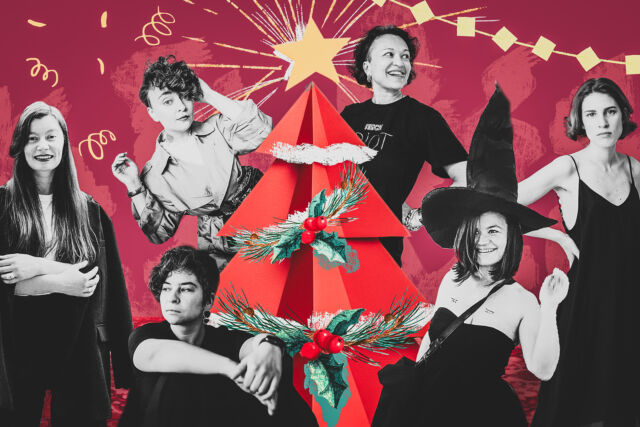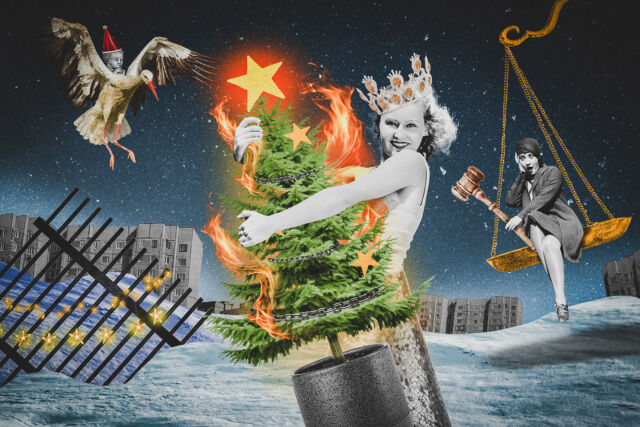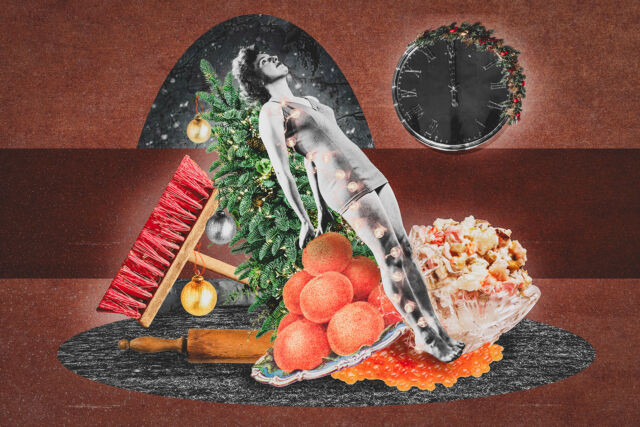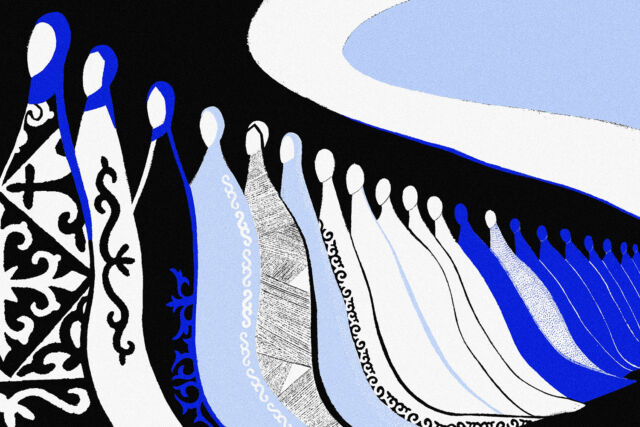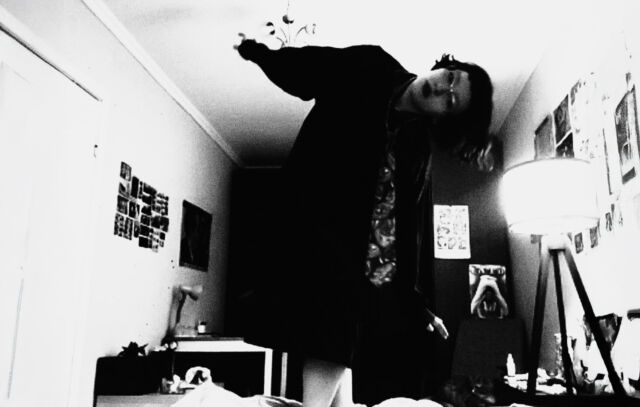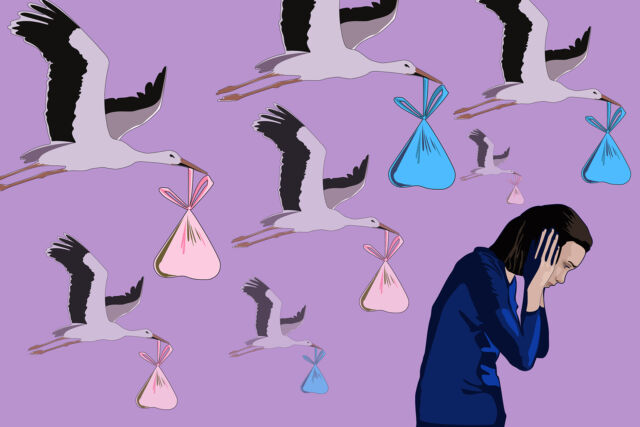More than 80% of crimes against children in Russia are committed by family members. In most cases, it is also the family or the family’s close friends who subject children to sexual violence. The majority of victims are girls who don’t usually speak out about their experience. And if they do, it happens when they grow up. Maria Kufina realized what her father had done to her when she turned 15 and started writing about it in her blog. Now she is 19 and trying to deal with her trauma and help other women who had the same experience.
Masha told Glasnaya about how the father she used to adore turned into a monster and why the adults never suspected anything.
A perfect dad
I had a great start in life: the day I was born, my father was hospitalized due to alcohol intoxication. He decided it was the best way to celebrate my birth. He was drinking throughout my whole childhood but it didn’t bother me much. I loved him a lot, way more than my mom, because he was cool. Everybody dreamt about a father like him. When I was little, he always came up with different things: fairy tales, games for the two of us. He organized cool photoshoots—for example, we could drive around town and he would take pictures of me near every fountain. We went to the woods, parks, and ponds—he was basically a perfect dad except for the fact he was drinking a lot every day
Well, at first, he did it occasionally. But by the time I was seven, he had already been drinking non-stop, to the point he couldn’t manage to go to the bathroom.
My brother and I tried to clean up after him quickly so that our mom wouldn’t see it and wouldn’t start fighting. But she saw everything anyway. Dad was always losing me in public places, for instance, at a playground or an ice rink at 10 pm. I was used to it and it was fine for me. But when he started drinking so much he never got sober, my mom asked him to leave.
They got divorced and he started living with my grandmother, his mom. The court decided my father could only spend weekends with me. “Don’t tell mom” became a phrase I heard a lot from him when we were together. I couldn’t tell mom he bought alcohol for himself and some treats I wasn’t allowed to have and was allergic to for me. I couldn’t tell mom he left me somewhere and went drinking with his friends. He kept telling my brother and me that he would stop drinking for us. And then I would find a bottle of alcohol under his pillow. But I loved him so much, I always saw a perfect dad in him. When they got divorced, I even called a crisis hotline and asked for advice—I wanted to stay with him but I had to live with my mom.
First time
As far as I remember, it all started when we went to Altai with my dad. I was 10. It was just the two of us, we were to live at his friend’s place. At first, it was going great, I grew up in the city and only travelled to our summer house. I had never been to places like that one before. It was the first time I took a night bus. It was very dark and I could see the stars, it was really beautiful. I was very impressed and happy.
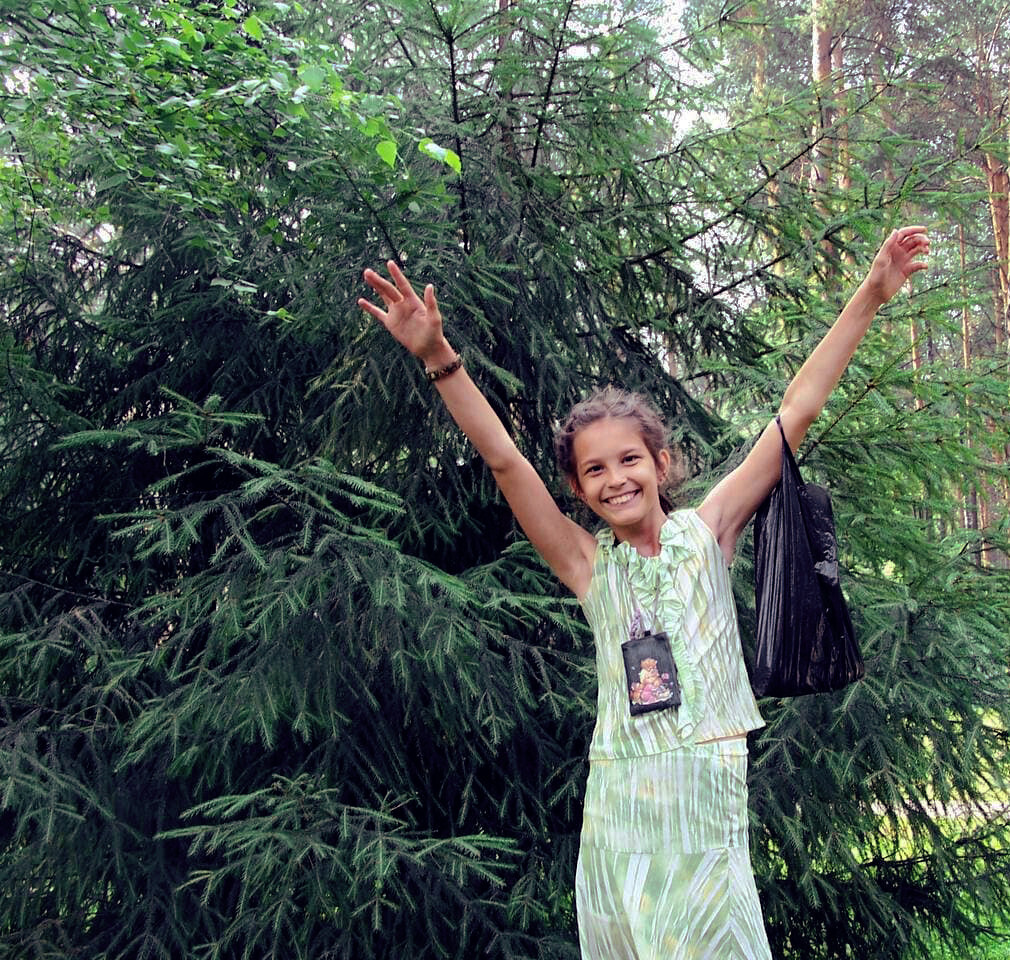
It was night, I was tired and leaned against the window to sleep. And he said, “Lay on my lap.” I thought that was weird because we never did that before. He insisted and I thought, “Why not? He’s my father, it’s going to be more comfortable, soft and nice.” I laid and he started touching my stomach, shoulders, legs… I quickly got up, sat, and didn’t sleep that night—though I didn’t understand what happened. Our family was very religious. The idea that God was always with us made me happy, as well as going to church on Sundays. And, naturally, because it was an Orthodox Christian family, there was no sex education. I didn’t know anything about boundaries and which parts of my body weren’t ok for others to touch.
I pretended like nothing happened. I was thinking about the great holiday—horses, mountains, a mountain lift, and beautiful lakes. But we ended up taking a lift only once and seeing only one lake. And for the rest of the time, he was drinking with his friend in the flat.
One evening, when we were at the table together, he told that friend I was lying on his dick.
First of all, I have a question for my dad’s friend: why did he ignore that?
Secondly, at that moment, I decided I was very dirty and that I had sinned. I was praying all night asking God to forgive me. But aside from that, I was fine with the Altai vacation. There was a summerhouse, a cat, and horses I visited all the time.
On our way back, dad got drunk and fell asleep on the bus. It made me feel really ashamed. Everyone had left and he was laying there, I barely managed to drag him out. But when my mom asked me how the vacation went, I said it was good. Because we had that rule we didn’t tell mom anything. And as for that first time on the bus… I decided to let it go because it seemed like I had prayed enough and it was fine again.
“How’s your mom doing?”
When I was eleven, my mom got sick. And it wasn’t getting any better. She started having one doctor appointment after another in the summer. And only in December, they asked her to do a CT scan. It turned out she had cancer. When they told me about that, I only knew it was some kind of disease old people died from. Mom was hospitalized and my brother and I started living with our grandparents. They didn’t really explain much to us—they were terrified, too.
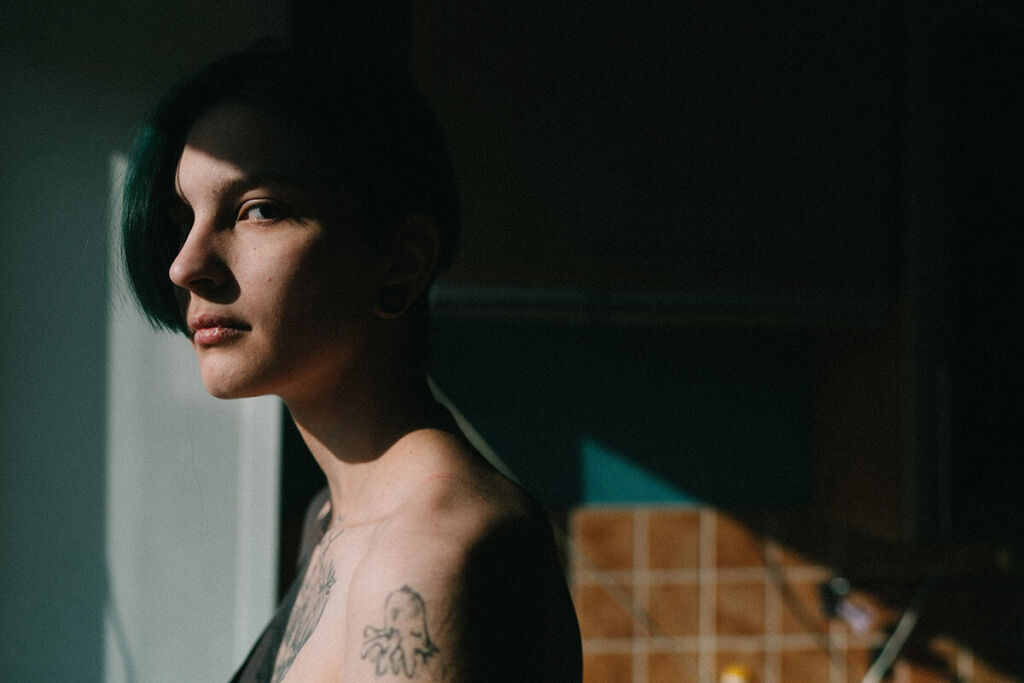
Our teacher told everyone in the class about my mom’s condition. And my classmates—we were all about 11 or 12 years old—decided it was dangerous and stopped talking to me. Once, I came to school, and instead of saying hi and having a chat with my friends, they asked me, “How’s your mom doing?”
It could’ve worked out with my classmates if I behaved as if nothing happened. They would understand it wasn’t as scary as they thought it was. But the teachers were pitying me even though they actually didn’t care at all. They started giving me better grades. They treated me differently. All those privileges I didn’t need separated me from the group. I was isolated.
Meanwhile, my father started visiting mom at the hospital and telling her she was his true love. He came there sober and brought flowers. He would say, “How can it be that the children are living with their grandparents when they have a father?” And mom decided it could work out—he wasn’t drinking—and that we should all live together.
Second time
During the first month, father kept it together, he didn’t drink. However, he was rude, harsh, and easily irritated. But I still thought he was the dad I used to know and that we had a good relationship, even though he wasn’t acting normal.
When he drank for the first time that month, he came to my room and dashed all the hopes I had for my mom’s recovery. He said she had stage 4 lymphoma, that the chances for her to recover were less than 20 percent. He told me she was going to die. And that doctors were doing everything to make her get better but she most probably was going to pass away. “And who is the one to blame?”, he asked. Then he replied it was me. Dad said that if I had taken more care of mom, it would have been fine. That I should’ve looked after her. That I didn’t help her around the house, that she took the dog for walks even though it was my pet. And that now, she was about to die and there was nothing we could do about it. Then he said, “So, you’re upset with the news?” I replied, “No,” even though I could barely breathe. He said, “Weird, I would be upset,” and left.
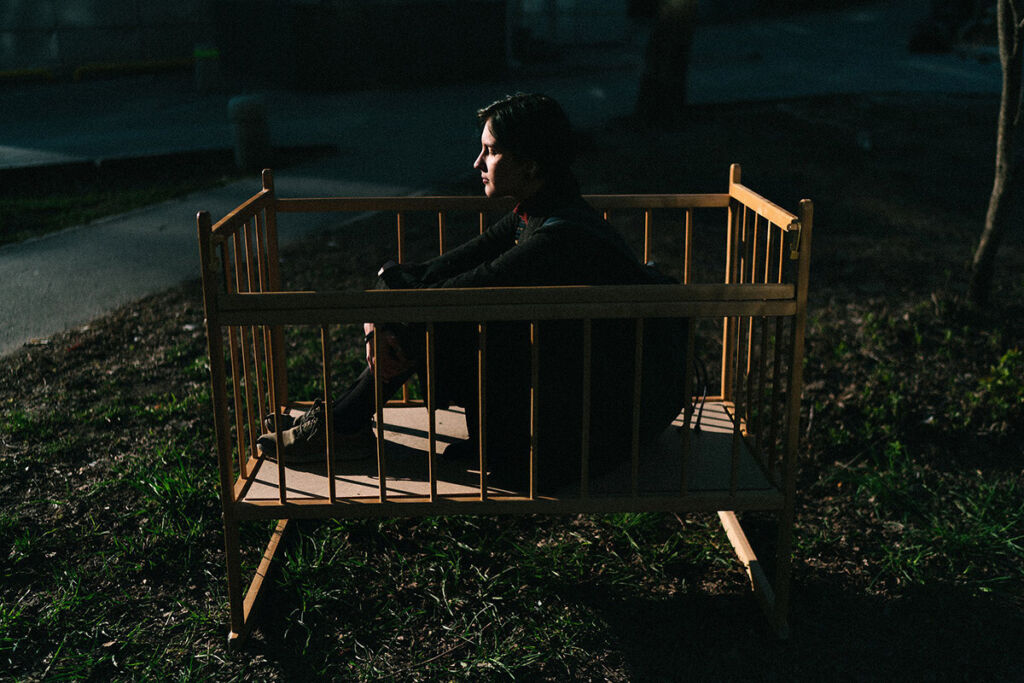
I cried. However, the following two years, I didn’t cry once. It was as if I turned off my feelings.
It all started when someone sent me a care package with some clothes. Dad asked me to try them on as if it was a fashion show. I put on a dress, it was too big for me but I was fine with it. I was twelve and I had a beautiful dress on. He told me to take a seat on the couch with him. Then he grabbed me with his two hands and whispered in my ear that I was very beautiful and sexy and that I made him hard.
He started touching me. First, my breast, then my stomach, all that while holding me tight. At first, I froze, then I flinched and hit his fracture with my elbow. His arm was broken because he had gotten drunk and fell on the street. He had fracture complications, and I hit that very spot.
He pushed me, and I fell on the floor. And when I got up, I felt ashamed I hurt my father. His pain turned into anger. He told me to go change again. I went and put on a white zipper shirt with a collar, and came back to him. He said I should wear such clothes without a bra because that was trendy. I took the bra off. Then he unzipped my shirt to the stomach and said he was my father and I shouldn’t be shy around him.
And he started touching me again, from the breast to the stomach, as if he was carving a piece of meat, as if it wasn’t his daughter standing in front of him.
At that moment, I zoned out completely. I don’t remember how I came to the room and what happened next. I remember those years only partly. I can’t tell how many times it happened—my brain blocks it. I thought I would remember everything one day, but it’s been five years and it’s not happening, even though I have almost no symptoms of PTSD anymore.
Talking to dogs
It became more frequent over time. He would get drunk, come to my room, close the door, and something happened. I zoned out. I remember the pattern on the wallpapers very well—I would look away, stare at the wall, and feel nothing. I wasn’t there. I don’t remember what was happening in my body.
I started reliving those experiences later, while having flashbacks. I suddenly started feeling everything that was happening to me back then, it was extremely bad, as if I was being raped again. At first, it was the breast, stomach, and legs, then he started touching my genitals, he didn’t see a problem with that. There was no penetration but he raped me with his fingers. The first time it happened I suddenly could feel everything—it hurt like hell and it was very scary. So something new happened, I stopped being a doll, and I even tried to move back. But he started doing it rougher because I suddenly turned out to be alive.
He was still drinking a lot, he could take a dog for a walk and then I would get a call from a friend who would say, “Your Jack is running around here alone.” My dog is my soulmate. I would go looking for the dog, then for the father, and carry him home. Sometimes mom came home from the hospital—she was allowed to stay for about a week. She asked me how it was going. I told her it was fine.
And when I read my diaries of the time again, I realized I developed this picture in my head that mom was weak because she was seriously ill, and dad was weak because he drank. But there always had to be a family member that stayed strong, and that was me. I never told anything to anyone.
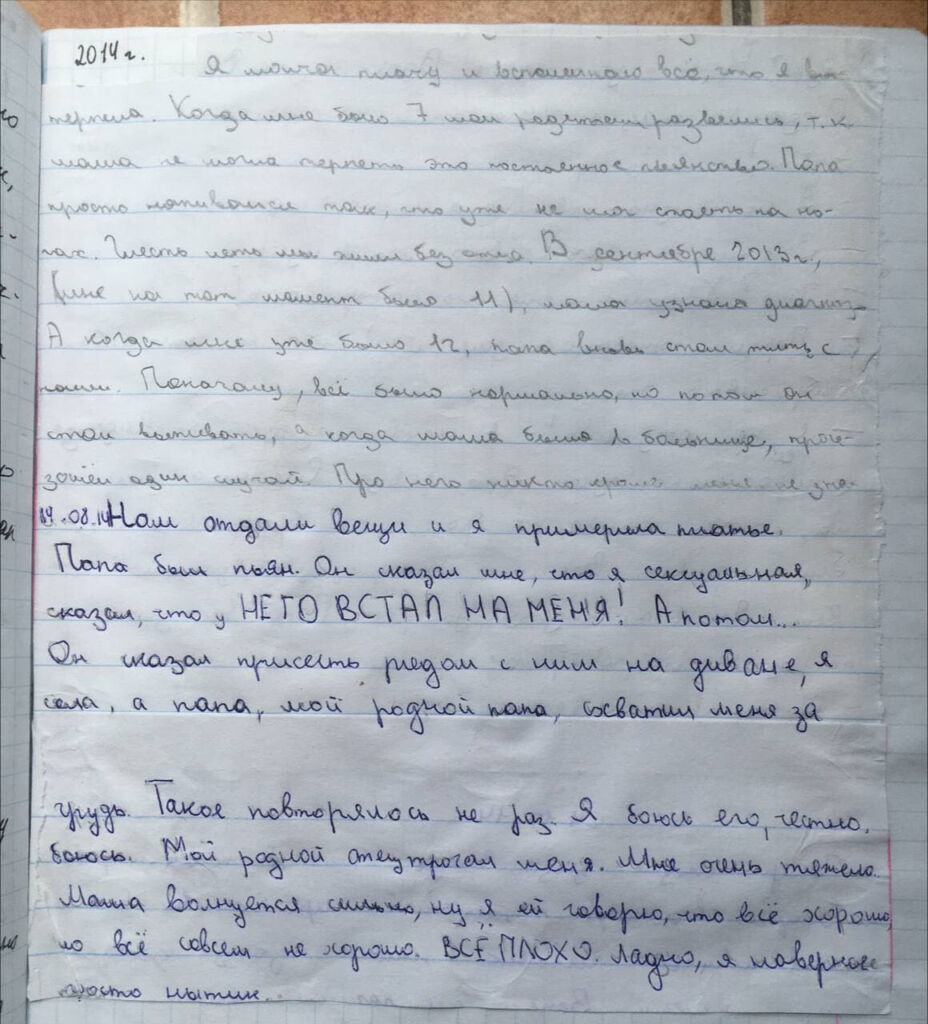
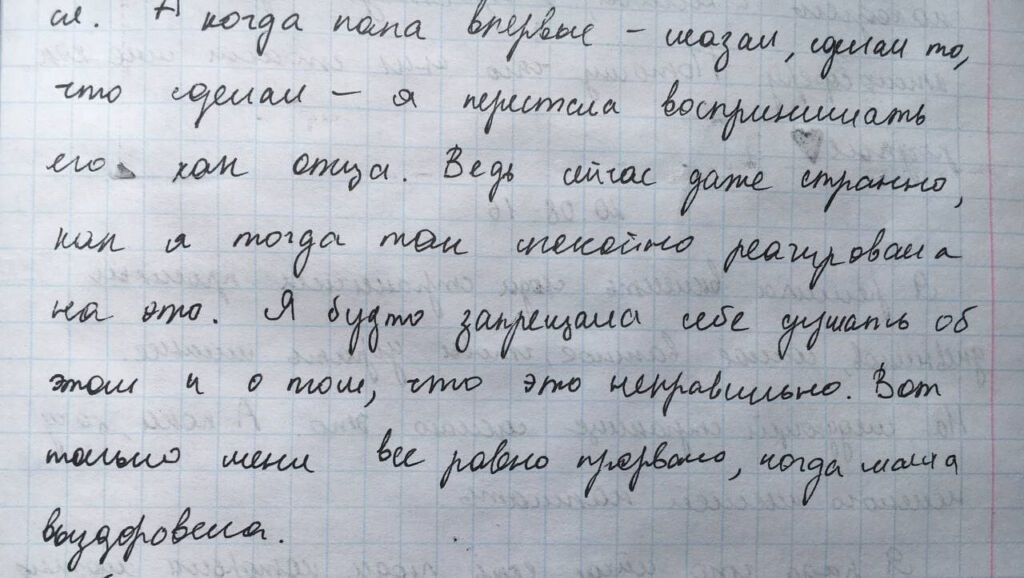
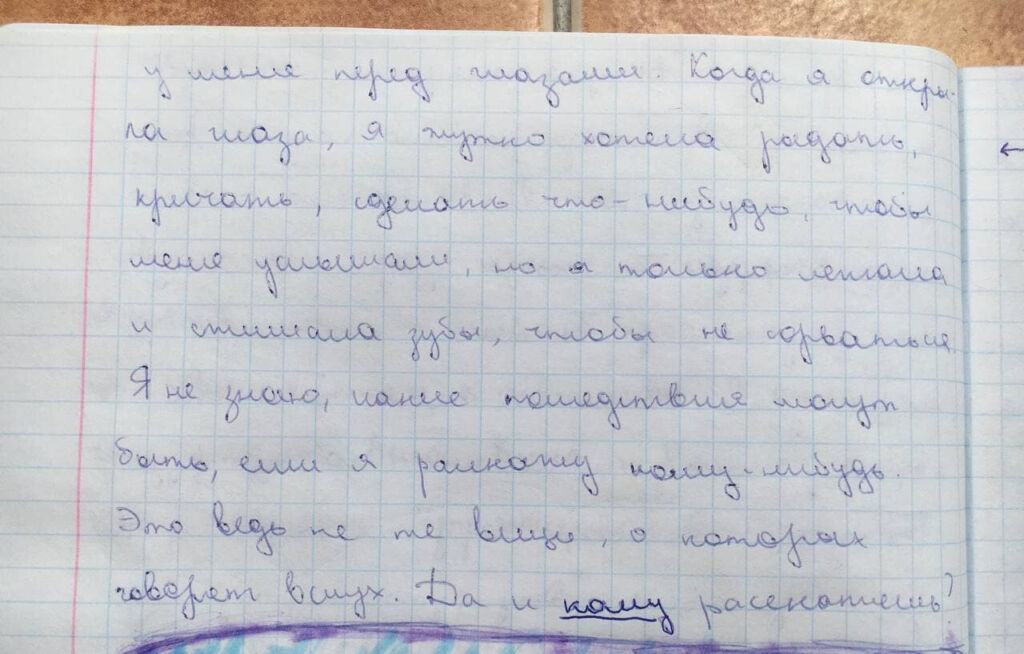





Fragments of Mary’s children’s diaries. Photo: Maria Kufina’s personal archive | Glasnaya
My academic performance got worse. I stopped studying. Mentally, I wasn’t there in the classroom. And I stopped talking to people. I felt empty. Everyone around me kept saying I should take care of my mom. So I did. I didn’t tell her about what was happening to me.
I didn’t even think my life wasn’t normal. It was hard and sad that my mom had cancer and my dad was drinking. But I didn’t think I was harassed and raped at home. I didn’t have a vocabulary for that, I didn’t understand what was going on. I could carry my drunk dad home and then reply to someone’s text saying I was doing well.
They justified the changes I was going through at school with my mom’s illness. Nobody asked me if other things were happening at home. And frankly, I don’t know if I would tell anyone. I didn’t realize it was something bad.
I started visiting an animal shelter during that time. I worked with dogs that were scared to live and were afraid of everything. I would enter their cage and start talking to them. It was very therapeutic, nothing could help me more than that. I would sit there with a dog growling at me and have my back turned to the dog so that they weren’t afraid of me. And I would say, “I can see you’re scared, I’m really scared, too. You know, sometimes bad things happen to you in life…” So I would just keep talking and the dog would start acting normal. That was my way to get things off my chest. I saw someone feeling what I felt and that I wasn’t alone.
During the first six months, I visited the shelter without talking to anyone. I tried to ignore all the volunteers there, I would just say hi and go work with the dogs.
I was afraid of changing my clothes in the shelter. I was uncomfortable with changing my jacket: that would mean I had to take my clothes off in front of people and it didn’t feel safe. So I went home with dirty clothes and a ripped jacket on, with paw prints everywhere. But I was happy. The shelter was one of the main things that helped me not lose my mind.
Once, dad got a nosebleed and it didn’t stop for an entire day. They took him to the hospital and did nasal cauterization. And he fell into a coma. He had two clinical deaths in two days. They said it was an alcoholic coma. You aren’t supposed to live after having two clinical deaths in two days. But he did. I didn’t know what I was feeling at that time. My father was in the hospital but I didn’t care at all. And while dad was in a coma in the hospital, mom got released with a partial remission. She’s doing well now, she’s alive.
Mom came back home. My brother and I took care of her so she wouldn’t get ill again. Then dad returned home, too.
And we started a life of a normal family, except he still came to my room at night, closed the door, and… I know that if I had screamed even once, it all would have stopped there.
But how could I do that if mom was home? On the contrary, I tried to be more quiet and keep everything a secret. I knew that if she found out, it would have killed her. I had to stay silent because I knew it would be too shocking for her.
Actually, the things I was experiencing at the time can be explained by structural dissociation. It is caused by trauma. But I didn’t know that back then. I only realized that when I was around 15 or 16, when I started reading literature about trauma and how to cope with it.
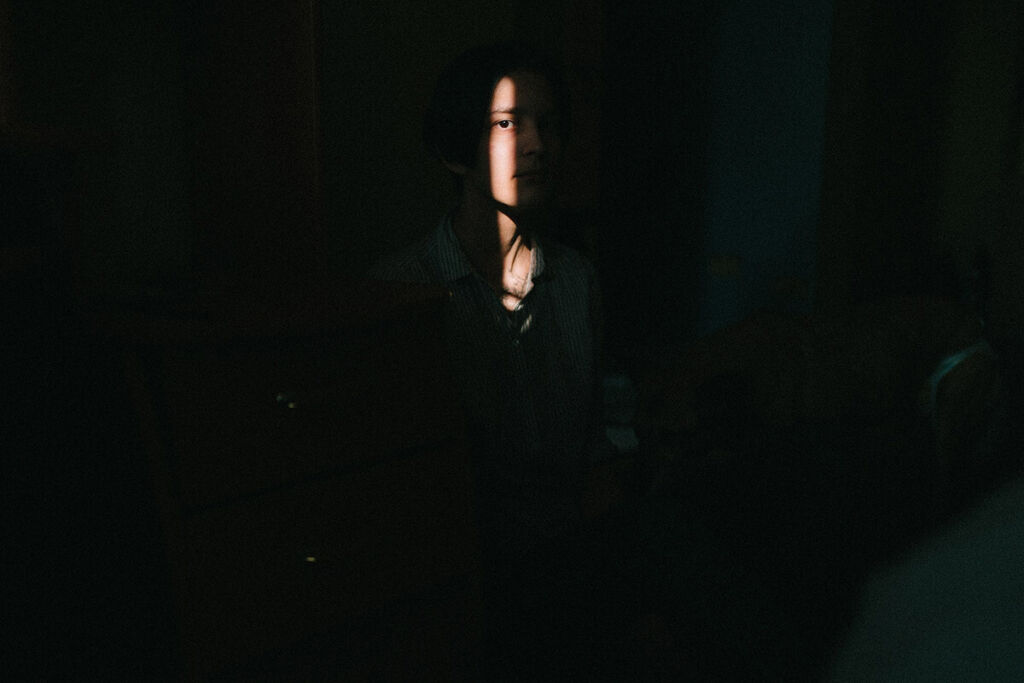
Luckily, dad managed not to drink for only a month. So mom told him, “You should go live with your mom, we’ve had enough.” He left. He visited us and slept over at our place occasionally, but I tried not to be home during those times.
That went on for about four years. For a year and a half, he came constantly. Then started visiting us every once in a while.
PTSD
Two months after he’d gone back to my grandmother’s place, it got really bad. At first, I started having emotions again. But all I could feel was the filth, as if I was covered in dirt and couldn’t wash it off. I felt dirty not only on the outside, but on the inside as well. I suddenly realized everything that happened to me but I didn’t know how to describe it. I didn’t know what those things were called. I only knew he was “touching” me. I had two different images in my head: one of everything he did to me and one of a “good father”. I couldn’t just say my good loving dad was touching me, I thought that would be unfair and wrong. I was convinced I had a good family and everything was fine.
I started googling stuff. My first search was “my dad touches me”—I ran into porn. And I thought that wasn’t it, it wasn’t about me, it wasn’t what I needed.
I had four friends at the animal shelter at the time. I told one of them about my mom having cancer. And she told me her father put hands on her, meaning he was beating her. I thought, “That’s it!”. “Putting hands on someone” was the perfect expression for describing my situation. Dad used his hands, he was putting them on me—it all made sense. Fathers beating their children wasn’t something unusual. It was way more widespread than fathers raping and harassing their children.
It was something acceptable, and it felt like I didn’t denigrate him that way.
And at the same time, I was sure I deserved all that. That I was a horrible person, that my mom nearly died because of me. And that I, of course, deserved the worst.
I started cutting myself. I cut the parts of my body nobody could see. I was cutting myself without anybody knowing about it for approximately two years. I was punishing myself for my mere existence.
I really wanted to tell someone about what was happening to me. I was telling this story in my head. I formed sentences and learned them by heart so I could tell someone. Every night, I fell asleep thinking about how I would do that. But then I woke up and didn’t understand who I could share this with.
My mental health was getting worse, I started having PTSD. I had nightmares every night, I couldn’t sleep, I woke up screaming. I had sleep paralysis, horrible anxiety, and I started having panic attacks. I couldn’t study because I was so anxious.
And then I had my first flashback. It is when you feel the things you experienced during your trauma as if it is happening right now. You can start hearing the noises from that past event, see it happening to you, or only see the person or smell things. As if you’re there again.
Once, I was going to sleep and suddenly felt like something was penetrating me. And then I saw him near my bed. I thought I’d gone crazy, that I was hallucinating and had to go to the hospital and spend the rest of my life there. That’s when I realized I needed help.
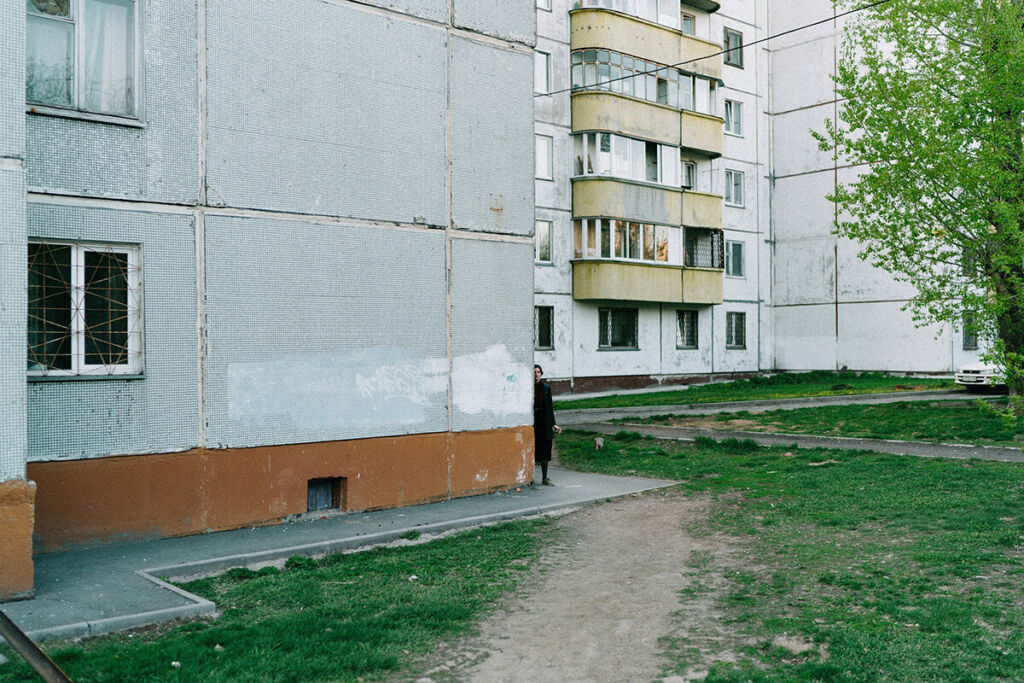
I texted my friend, the one I trusted the most, “When I said my dad was putting hands on me, I didn’t mean fights,” I wrote. And she reacted really well. She replied it was very hard and very scary. That he should look at himself in the mirror and feel sick of himself. She texted she didn’t change her opinion about me, that she still thought I was a wonderful girl. She did a great job, it’s thanks to her that I keep sharing my story.
She said she would be there for me for as long as I needed it and that she was ready to help. It was really important for me. I felt better for some time because I told someone about it and it suddenly became real.
But then I started permanently feeling bad. I thought about death every day. My flashbacks changed to panic attacks, and instead of lasting five minutes, they could last for hours. There are many PTSD symptoms, different people have different combinations of them. I could suddenly get short of breath. I couldn’t take a deep breath—my heart would start beating really fast and I’d start shaking.
Those who live with PTSD sometimes have physiological reactivity. It’s when you are always prepared to react, you are constantly stressed out, looking over your shoulder, and ready to protect yourself. All this makes you really anxious, to the point you’re shaking and unable to control yourself.
Sometimes I would get tears in my eyes that I couldn’t control. And it was happening during my classes. I could just sit and all of a sudden I would start shaking, my heart would start beating too fast, and I couldn’t do anything about it. It made my life really hard.
Recovery
I didn’t get very lucky with my psychologists. I was literally going crazy, I stopped being myself. This is probably the most difficult part of trauma recovery—trying to get your old self back and failing. You no longer exist, you’re somewhere out there, you’re dead. Now, there is another version of you, the one created by his sweat, his hands, his breath, and the smell of alcohol. Your old self doesn’t exist anymore and you don’t know how to get her back. My failed attempts to get myself back were really demotivating. It seemed like it would never get better. But I got lucky with my coping strategies: if I don’t understand something that is happening to me, I try to sort it out. And I will keep doing it until I find out the truth, because I really don’t like feeling like I’m not in control. So I started looking for information on the topic.

I found a book called The Boy Who Was Raised as a Dog by Bruce Perry. The author, a child psychiatrist, tells about his most difficult cases and uses them to illustrate how the brain works under stress and after traumatic experiences. The eighth chapter was called The Raven. It was about a girl who was being raped by her father. It was the first time I read something that was describing my own experience.
I marked the word “dissociation” from there and remembered it. Also, the girl was cutting herself, just like me. But her story ended well. And I realized I was going to be alright, too. I started buying every book on trauma I could find. That’s how I understood what was happening to me and what I should do with my PTSD.
At the same time, when I was around 15, I realized my symptoms weren’t only related to PTSD—they were matching those of the borderline personality disorder fully. It turned out that while PTSD was somewhat manageable, the borderline personality disorder was a complete nightmare. I was also hurting others, I was toxic, abusive, I was forcing things in my love life and manipulating people. I suddenly realized I was crossing other people’s boundaries because I didn’t know better.
That was also the period when I realized I was a lesbian. I used to be this girl from an Orthodox family. It was hard for me because I had to give up on God and rewrite my life story without him somehow.
I was asking priests about lechery and purity, and about what a girl should do if she had been raped. They replied, “She has to confess.
Because there is physical innocence, and then spiritual one. If she confesses, everything will be fine.” I didn’t understand why I had to confess. That’s how God stopped being a part of my life.
I’d never been in a relationship with guys because I was terrified of them. But I had relationships with girls. My first relationship ended in two weeks. It was the first time I had my flashback in front of someone and that girl told me I was too broken for a relationship. Generally speaking, she was right.
I was always feeling bad, I thought all the compliments people were giving me were about my borderline personality disorder, not me. They would say I was kind, but I just wanted to be convenient so that I wouldn’t get rejected. They would say I was responsible, but I was just feeling guilty all the time.
At some point, I cut off everyone who was important to me. I started healing. I was fixing myself and doing everything I could to heal. I knew that otherwise I would keep losing people, being promiscuous, letting people use my body, and feeling bad after.
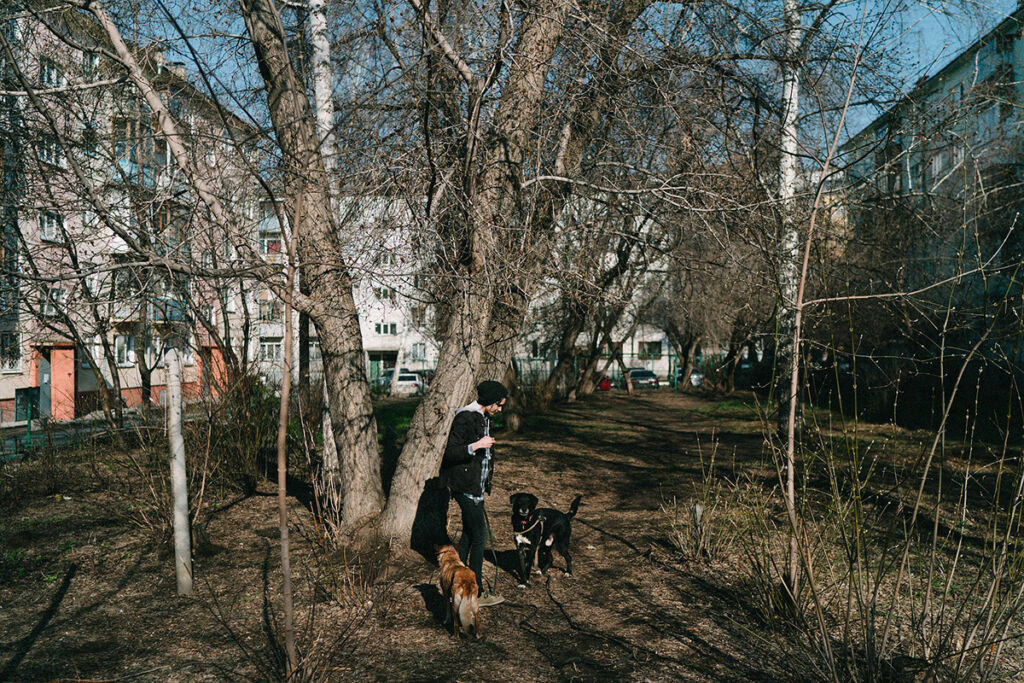
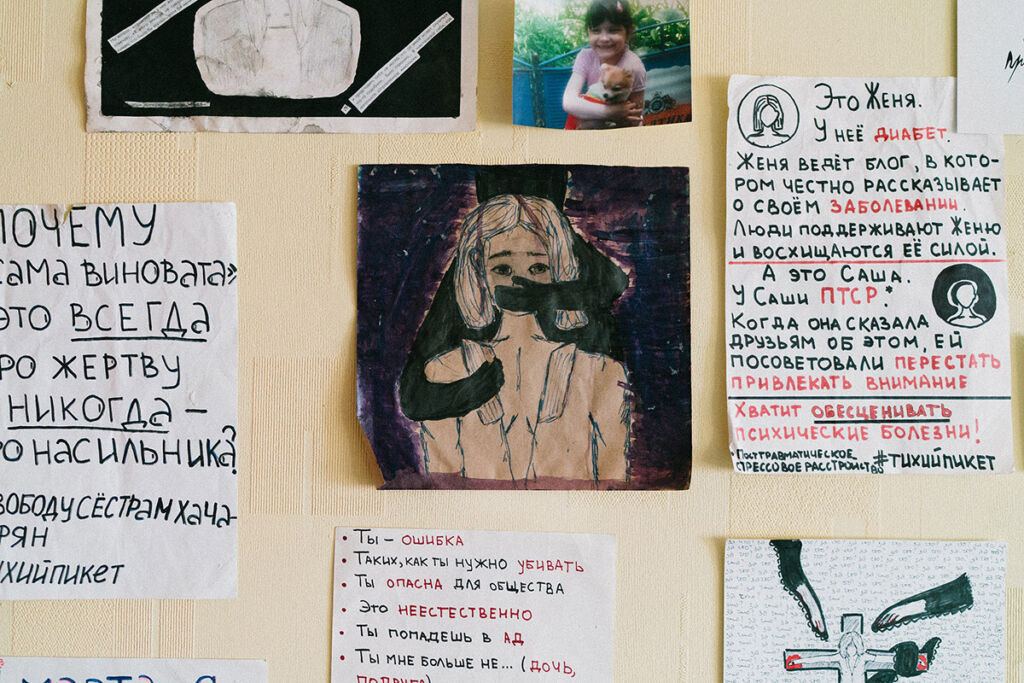
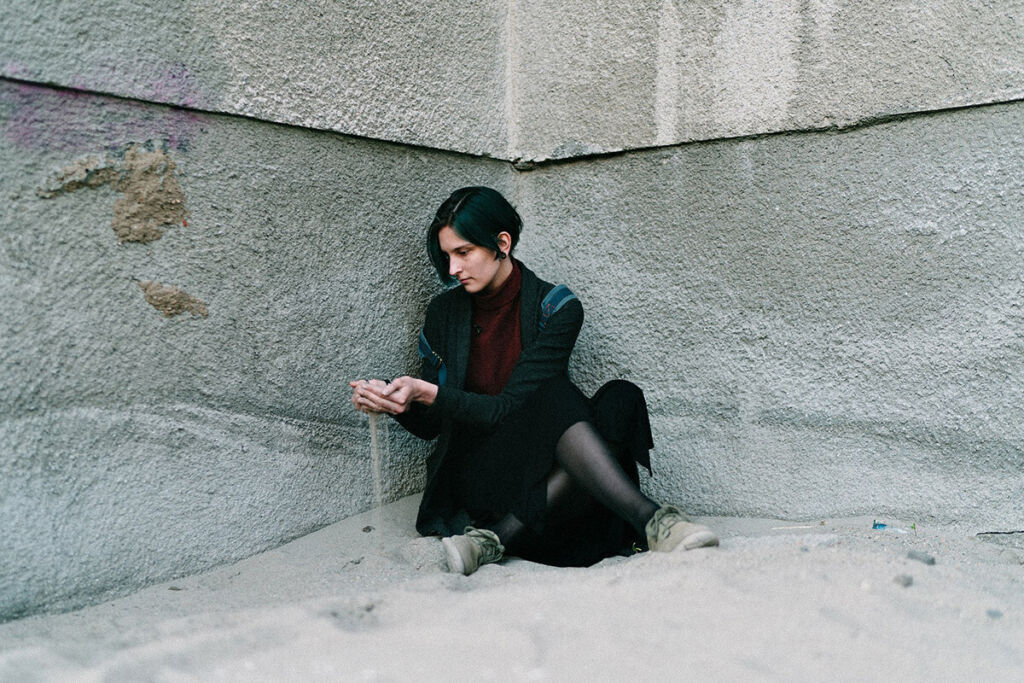
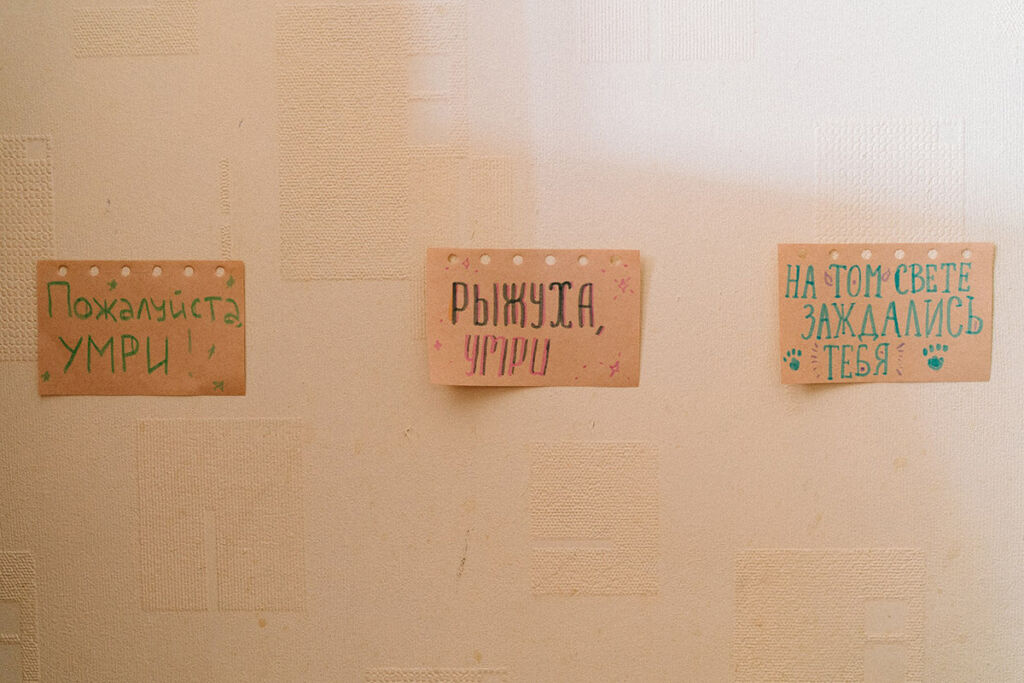








Photo: Anton Unitsin | Glasnaya
And it started getting better. Recovery felt like a superpower. Of course, I knew I would never have the life I had had before my trauma back. It was the world where my father wasn’t raping me. And that world didn’t exist anymore. But I started talking to people again when I realized I was getting better. I became my own support system.
Life after trauma
Nowadays, the PTSD symptoms only appear in autumn and early winter—when everything started—and I go back to those times. But each year, my feelings change. I used to hate my dad, I considered him a moron and wished he was dead. But this year, in December, I suddenly realized my inner child still loved him. That’s when I started going through the grieving process. And I’m really happy that instead of having flashbacks and nightmares, I had a chance to experience this grief—the grief of losing a loving father.
That’s how you learn about the new layers of trauma, and everything slowly gets better. I understand a lot of consequences are going to stay with me forever, and that’s normal. That event became a part of my life, in the same way getting a dog did. Trauma doesn’t define me, and at the same time I don’t deny it. But I also realized that
if I can’t stop talking about it, I need to make sure it doesn’t make others uncomfortable and it is helpful.
So I started posting online. At first, I wrote about mental disorders, PTSD, and self-harm. Then I started talking about my father raping me on my Instagram.
My blog isn’t that big, it’s just a personal page where I started writing about my experience at some point. So people don’t message me often. If they do, they usually write that they’ve had similar experiences and that they feel the same. Or they ask me how to deal with different emotions. It was very funny when a man messaged me once saying that he had an amazing family, three kids, and a beautiful wife. He said that he had read my posts and wanted to tell me that not all men were like that. I politely replied that it wasn’t the right place for him. And then it turned out that the perfect family man was hitting on a girl from my work, and he was really pushy. I know, I know, not all men are like that.
People just can’t wrap their heads around it. They think it’s pedophiles or serial killers who rape, not fathers. And if that was a father, then he probably was a really bad person. The truth is he wasn’t, he was a very good father. People don’t get it and start asking me why he did that. But I have no idea.
After everything that happened, I reached out to him once, it was my psychologist’s advice. I wrote a huge message, “You probably don’t remember that but you were raping me. Now I have scars, PTSD, nightmares, I can’t have a normal life and will never be able to. I’m really mad you can live on and I can’t. I hate you.” And sent it to him.
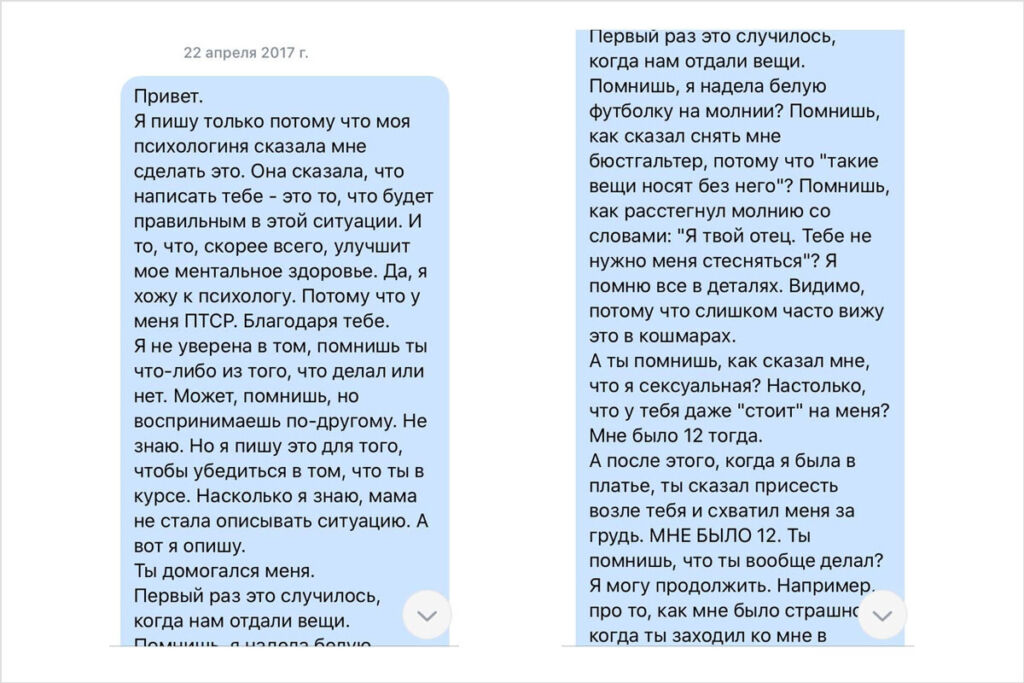
He didn’t reply. But shortly after, his mom, my grandmother I had a good relationship with, called me, “Why is it that you want to put my son in prison?” She called me a greedy bitch and a hypocrite. That was before I even posted anything.
I don’t expect him to explain himself or apologize because I know he is pathetic and cowardly. His daughter messaged him, “You were harassing me,” and he went complaining to his mom.
I was thinking about filing a police report about a year ago. But then I asked myself why I was doing it and if I was ready to make my life a mess for the next two years because of the investigation. And I decided that wanting him to understand what he did wasn’t a good reason for doing all that. He wouldn’t understand it, even if he spent ten years in jail.
I don’t remember the exact moment I told mom about what my father did. It just happened that she knew. I remember she once told me that it wasn’t my father who did that—it was the monster he turned into because of the alcohol. Like it wasn’t my dad but a whole other person. Mom was really against any kind of reports, she didn’t want me to say anything on the topic. We had fights, she told me not to embarrass the family. She was just very scared. We don’t talk about it now. But actually, my mom is really cool, she’s a nice person.
Nobody turned their backs on me after the posts in the blog. It’s not a crime to talk about what happened, I don’t do anything bad. Yes, I’ve been told that it was hard to read and that I should stop writing about it because there was no point in digging up the past. But they didn’t stop talking to me. However, there were people who stopped being my friends for another reason—after they found out I was lesbian.
Today, I help people who suffered from sexual exploitation and abuse, and there’re so many of them. The first time a girl shared her experience with me was when I was 15. I was in vocational school. We were in different groups. She wrote that she had read my posts (I didn’t write about myself at the time, I only published translations of articles on abuse) and told me her horrible story.
In this regard, it’s important to simply find someone who has similar experience. In most cases, people reach out to me not to ask for advice or help but just to make sure they’re not alone.
A feeling of chronic loneliness starts with your trauma and stays with you for the rest of your life. It’s hard to find someone like you, who has experienced the same and reacts the way you do. So when a person finds someone like that, they feel like reaching out. Most often, they just share their story, saying “I’ve never told this to anyone but I’d really like to.” I sympathize with them, it’s already enough usually. Staying silent makes you depressed. Victims often don’t have anyone to talk to. And I’m a perfect person for that.
Sometimes, they ask for advice on recovery and what they should do with PTSD. I publish everything I know, share my ways of dealing with these problems, and we all discuss how it can be applied to a person’s life. Those who don’t understand what’s happening to them also write to me a lot. They don’t know what those symptoms are and what your own head makes you go through. Understanding what is happening to you and knowing it is normal really helps.
Society knows children are getting raped but they think it’s happening somewhere else. And then they find me. But I don’t cry in my bed all the time, I live my life, and the idea of a person who was being raped as a child doesn’t match with my image today. The hardest part is that I kind of became an illustration because I’m not afraid to speak out. But they don’t see me behind that story. So at some point, I thought since I couldn’t get rid of being an illustration, I was choosing to be one. This topic is really tabooed. Why not talk about it if I can?
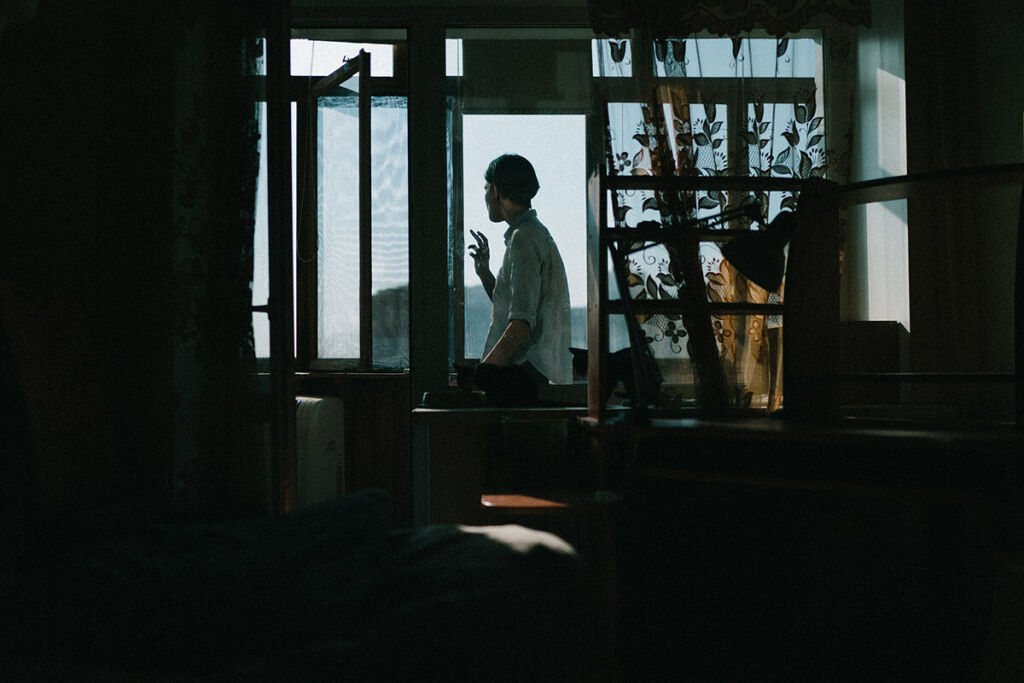
Veronica Antimonik, program coordinator, SafeHouse Foundation co-founder
—Nonprofit organizations rarely deal with sexual abuse in families since that’s what government structures do. For example, if child protective services find out about a case like that, a child might be taken away form the family and put into a children’s home. And very often, those kids end up having no help at all. We are trying to work with orphanages, sometimes we see cases like that, but we can’t help such children due to legal restrictions. And they usually don’t work with this kind of trauma in the facilities.
Children rarely ask for help. Sometimes, teenagers contact nonprofit organizations, but not every one of them is able to help. Luckily, there are NGOs that work with cases like that, for example, We Believe You, and crisis hotlines. So there are ways to get help, but if a child is still in danger, child protective services need to be engaged, because some things could be simply unsafe for a child. All in all, we don’t have a working system for detecting sexual abuse in families. There are no support and rehabilitation systems for these children, which could help them have a normal life after what happened.
A huge number of traumas and situations like this happen in childhood and are left unnoticed by adults. And the survivors seek help only when they are adult.
The majority of people perpetrating child sexual abuse are either close family members like fathers, uncles, and brothers, or people who are very close to a family, those who have access to a child and can build trust with them. That’s the base for abusive relationships that can last for years. Children are threatened and manipulated. The main problem is that any sexual violence that happens in childhood is very destructive for mental health. When an individual, a child, is still developing, it is hard for them to separate this experience from themselves, they start thinking it was their fault. Guilt and shame become a child’s only way to deal with the situation. A child thinks that because they are treated this way, there’s something wrong with them. Or that the way they are treated is normal and that is what love is. It’s a defence mechanism.
Any sexual abuse, no matter who did it, how many times, and at what age it happened, negatively affects a person’s entire life. The consequences can manifest themselves differently. It could be drug use, alcohol consumption, other forms of self-destructive behavior, self-esteem issues, problems with socializing and trusting others, etc. Only as adults, people can link their problems to the things that happened to them in the past, and seek help.
As an organization that works with this problem, it is especially important for us to emphasize that sexual abuse experienced in the childhood increases a person’s risks of being involved in commercial sexual exploitation. These people have higher risks of being involved in sex industry precisely because of their changed perception of their bodies and sexuality, and they become easy targets for criminals. Among our clients who were involved in sex industry, many had been sexually abused as children.
Masha is an activist of the Eurydice association (a Novosibirsk feminist association fighting against human trafficking for the purpose of sexual exploitation) and our colleague. She takes part in our collaborative projects and provides assistance to victims. We consider Masha to be incredibly strong and brave. She is not afraid to share her story, and we hope it will help others.

The Different series is a project by Glasnaya and Novaya Gazeta about people who do not meet the standards of today’s Russian society, which leads to them becoming invisible to the majority. In Russia, it is customary not to notice, to ignore “others”, those who are different—and ignorance becomes the breeding ground for xenophobia and discrimination.
Those who are different are often afraid to put themselves out there. But there are more and more people who have already overcome their fears. Those are women and men breaking stereotypes and the framework of patriarchy.
The material is published jointly with Novaya Gazeta.


